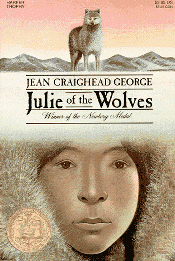|
|
|
|
I'VE BEEN READING A NOVEL with my kids, called Julie of
the Wolves. It's about an Inuit girl who survives months in
the wilderness with the help of a wolf pack and who must come
to grips with the impact of encroaching civilization.
We've learned a lot from this novel, written for juvenile readers,
including a good bit about Arctic winter survival (not really a top
priority for a Floridian, though you guys in the high reaches
might take note) and about wolves, caribou and ptarmigans ---
which are sort of an icy climate version of a fat quail. The
serious lesson in the book is about the quest for the survival of
native people's traditions and skills. In the course of teaching
that lesson, the author uses a wonderful native word:
gussack.
This is the Inuit term for non-"Eskimos" but in this book at least,
it has a deeper implication. The author doesn't use it as a
dismissive word for all those who are not native tribe members.
She uses it to refer to those who can never understand the ways
of nature or the native people. The gussacks are not just
non-Inuits from the lower 48; the gussacks are the
uncomprehending, the close-minded, those lacking any faint
understanding of a different way of life.
This column is intended to speak to everyone Jewish,
particularly to those who are dealing with similar sets of "life's
little moments."
Every now and then I try to
explain facets of our lives as modern Orthodox Jews. On paper,
it usually works. But sometimes in conversation with
non-Orthodox Jewish friends, particularly those with little
exposure to this kind of observance, I feel like an Inuit talking to
a gussack. I find the divisions between Jews particularly painful,
perhaps parallel to the divisions between city and wilderness
Alaskans in this novel.
Like devoted talkers everywhere, I keep hoping I can simply
explain these divisions away. We have so much in common,
why can't we bridge our gaps any better than we do?
I would love to be able to just talk a little about our decision to
follow more Orthodox observances, without anyone thinking I
was an alien from another planet, a critic of their level of
observance, or a throwback to medieval Europe.
I was raised Conservative, joined a Reform congregation while I
worked far from home, and have close family members deeply
involved in Reconstructionism, so I know our faith is the same,
though our observances are different. As Orthodox Jews, we
dress according to certain guidelines about modesty, we don't
drive or work or such on Shabbes, we eat kosher food, and we
send our kids to religious day schools. There are a lot of issues to
discuss when you grant religion this much domination in your
life.
I expect conversations with Jewish friends who aren't Orthodox
to begin with same two issues (feminism and shellfish), but I wish
they'd move on from there after a while.
Folks invariably want to know how I, a lifelong feminist of the
equal pay for equal work school, can live with such a sexist
system, and they want to know how I can bear giving up shrimp
and lobster.
The feminist issues are real and painful, particularly in terms of
synagogue practice, but they are hardly the only matters on the
table.
And, when I want to share (but not preach) the historic linkages
involved in keeping kosher, it is hard to get through to someone
who only wants to know how I live without lobster. Try great
fresh salmon or halibut or pompano with lemon and butter and
you'll see. I made my kitchen kosher more than 15 years ago, so
I guess I can skip the shellfish, but don't ask me to give up butter
and lemon juice. Truthfully, I miss really crispy bacon more than
I miss shrimp, and every now and then I long for a favorite
childhood snack: very hot beef pot pie with a very cold glass of
milk. But, never mind.
When pals only want to delve into the oddities or minutiae of
observance, while I want to talk about the sense of serenity and
spiritual connection Shabbat can bring, not only do they sound
like uncomprehending strangers, gussacks, to me ... I sound like
a gussack to them, too.
I wish we could be a little more communicative with each other,
more open to understanding and reaching beyond the
superficial, better at respecting each other's different approaches
to our unifying Torah. There should be no gussacks among Jews.
After all, unlike the hunters who intrude upon the Inuits, we're
all members of the same
Jewish World Review Nov. 3 / 13 Mar-Cheshvan, 5759
 The gussacks and us
The gussacks and us
By Erica Meyer Rauzin
JWR contributor Erica Meyer Rauzin comments on the
contemporary Jewish condition.